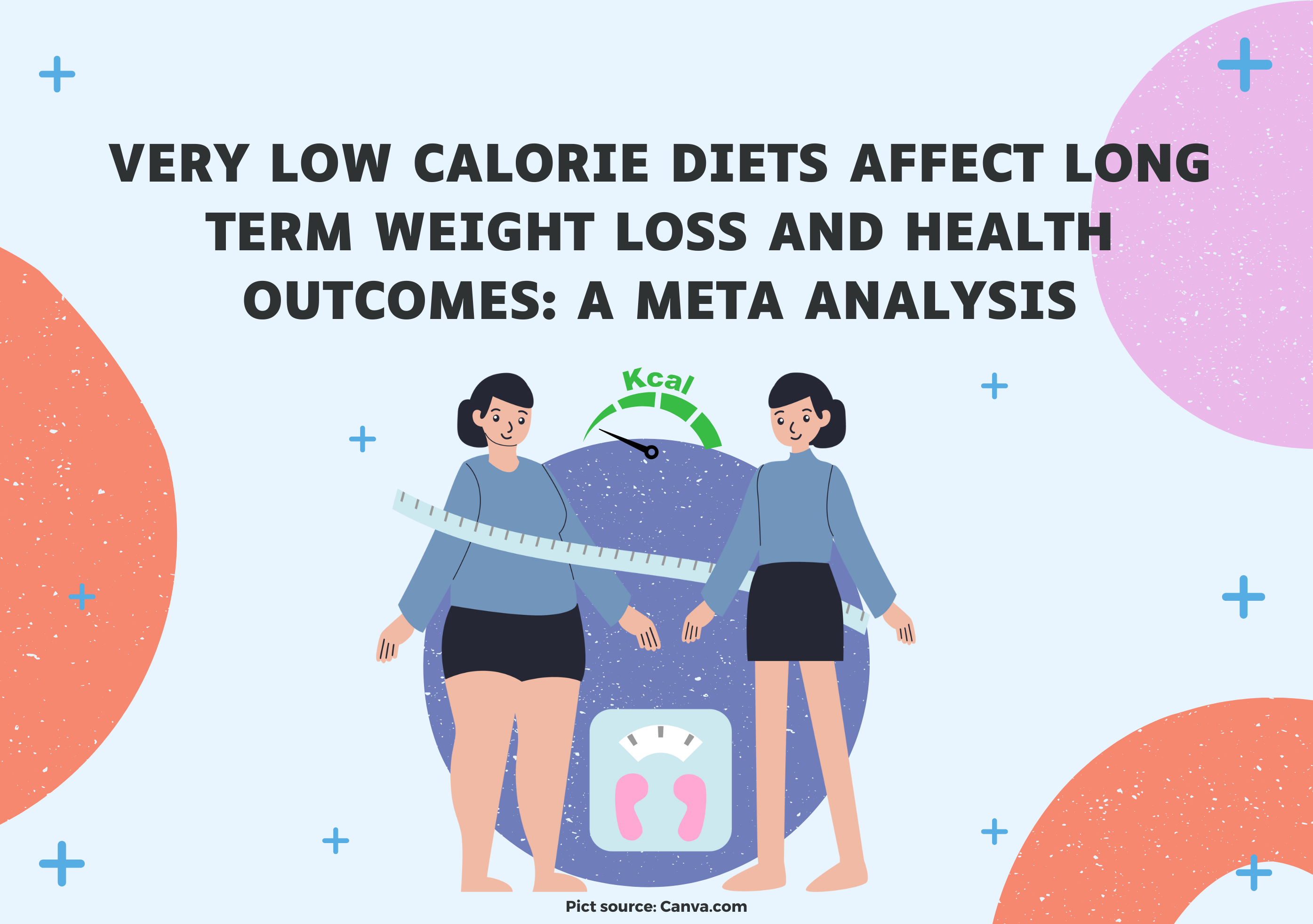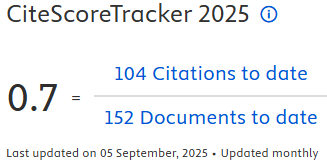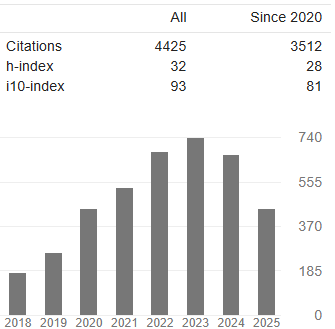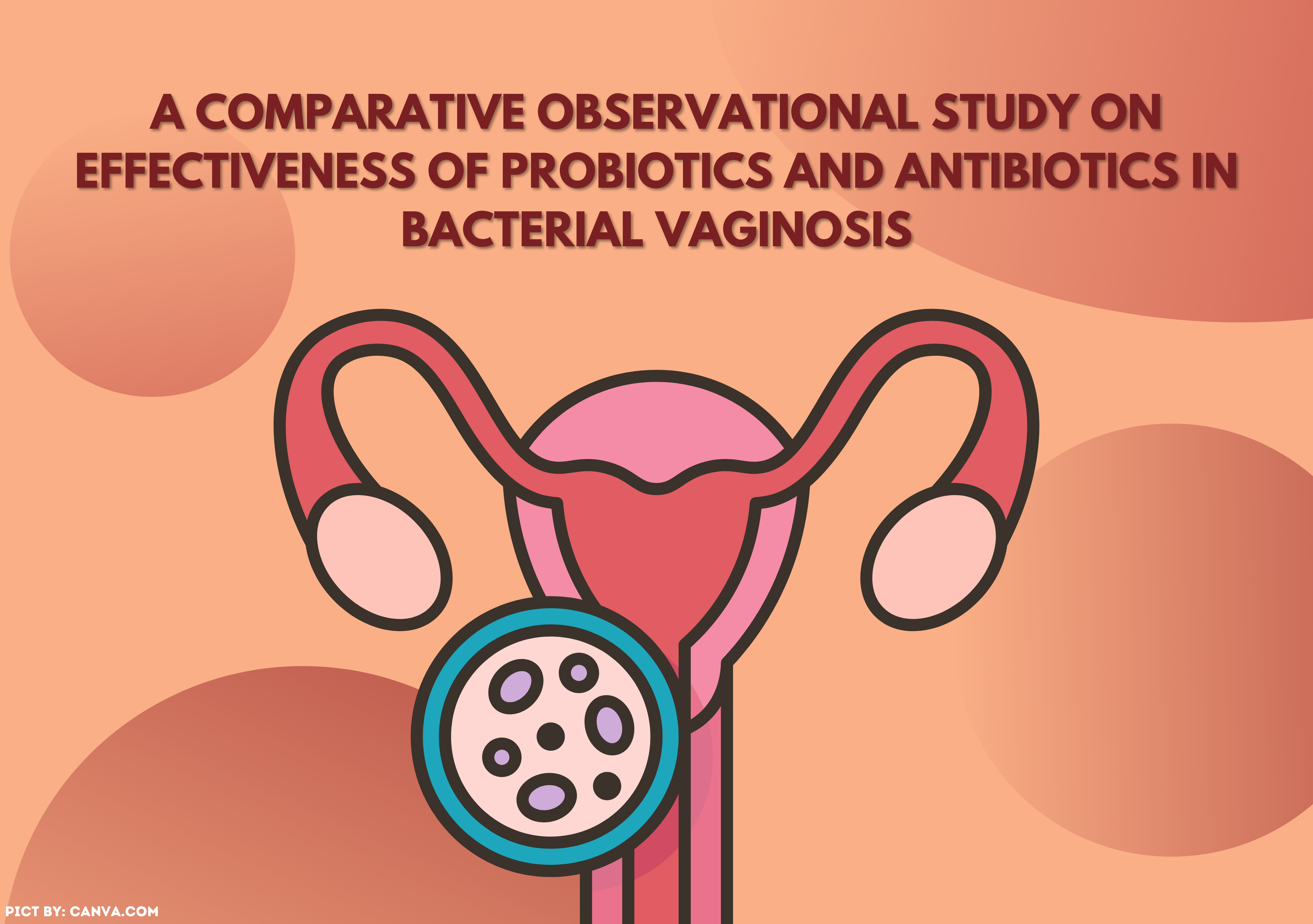VERY LOW CALORIE DIETS AFFECT LONG TERM WEIGHT LOSS AND HEALTH OUTCOMES: A SYSTEMATIC REVIEW

Downloads
Introduction: In Indonesia, obesity numbers increased from 10.5% in 2007 to 14.8% in 2013 and 21.8% in 2018. Very low calorie diets (VLCD) are currently gaining popularity to reduce weight, but can lead to inadequate nutrition and potentially negative health consequences. This meta-analysis aims to evaluate VLCD effect on weight loss and overall health outcomes. Method: Data were sourced from research journal articles in databases like Crossref, PubMed, Google Scholar, and ScienceDirect, published within the last 10 years either Indonesian or English language. Only studies involving adult subjects with minimum overweight nutrition status (BMI > 23 kg/m2) were included. Result: Ten from 1063 studies qualified the selection criteria. VLCD success in weight loss depends on treatment type, duration, physical activity, and genetics. Longer and fewer-calorie VLCDs lead to more significant weight reduction, but maintaining long-term success requires a structured weight management program. VLCD benefits include improved insulin sensitivity, reduced fat, and better heart function, but it may have temporary negative effects on metabolism, aortic elasticity, constipation, sensitivity to cold, headache, and dizziness. Conclusion: VLCDs can be an effective approach in achieving significant weight reduction and positive health outcomes, especially if combined with long-term weight maintenance programs and appropriate follow-up treatment. However, the decision to undergo VLCD should be made with wisely considering individual health conditions and in consultation with dietitian or health professionals, as there are potential side effects and factors that may influence long-term success.
Alamuddin, N., Bakizada, Z. and Wadden, T.A., 2016. Management of obesity. Journal of Clinical Oncology, 34(35), pp.4295–4305. https://doi.org/10.1200/JCO.2016.66.8806
Albuquerque, D., Stice, E., Rodríguez-López, R., Manco, L. and Nóbrega, C., 2015. Current review of genetics of human obesity: from molecular mechanisms to an evolutionary perspective. Molecular Genetics and Genomics, 290(4), pp.1191–1221. https://doi.org/10.1007/s00438-015-1015-9
Bray, G.A., Frühbeck, G., Ryan, D.H. and Wilding, J.P.H., 2016. Management of obesity. The Lancet, 387(10031), pp.1947–1956. https://doi.org/10.1016/S0140-6736(16)00271-3
Burnand, K.M., Lahiri, R.P., Burr, N., Jansen Van Rensburg, L. and Lewis, M.P.N., 2016. A randomised, single blinded trial, assessing the effect of a two week preoperative very low calorie diet on laparoscopic cholecystectomy in obese patients. HPB, 18(5), pp.456–461. https://doi.org/10.1016/j.hpb.2016.01.545.
Haywood, C.J., Prendergast, L.A., Purcell, K., Le Fevre, L., Lim, W.K., Galea, M. and Proietto, J., 2018. Very Low Calorie Diets for Weight Loss in Obese Older Adults-A Randomized Trial. Journals of Gerontology - Series A Biological Sciences and Medical Sciences, 73(1), pp.59–65. https://doi.org/10.1093/gerona/glx012
Hruby, A., Manson, J.A.E., Qi, L., Malik, V.S., Rimm, E.B., Sun, Q., Willett, W.C. and Hu, F.B., 2016. Determinants and consequences of obesity. American Journal of Public Health, 106(9), pp.1656–1662. https://doi.org/10.2105/AJPH.2016.303326
Jensen, M.D., Ryan, D.H., Apovian, C.M., Ard, J.D., Comuzzie, A.G., Donato, K.A., Hu, F.B., Hubbard, V.S., Jakicic, J.M., Kushner, R.F., Loria, C.M., Millen, B.E., Nonas, C.A., Pi-Sunyer, F.X., Stevens, J., Stevens, V.J., Wadden, T.A., Wolfe, B.M. and Yanovski, S.Z., 2014. 2013 AHA/ACC/TOS guideline for the management of overweight and obesity in adults: A report of the American College of cardiology/American Heart Association task force on practice guidelines and the obesity society. Circulation, https://doi.org/10.1161/01.cir.0000437739.71477.ee
Kraschnewski, J.L., Boan, J., Esposito, J., Sherwood, N.E., Lehman, E.B., Kephart, D.K. and Sciamanna, C.N., 2010. Long-term weight loss maintenance in the United States. International Journal of Obesity, 34(11), pp.1644–1654. https://doi.org/10.1038/ijo.2010.94.
Kumada, T., Imai, K., Takahashi, Y., Nabatame, S. and Oguni, H., 2018. Ketogenic diet using a Japanese ketogenic milk for patients with epilepsy: A multi-institutional study. Brain and Development, 40(3), pp.188–195. https://doi.org/10.1016/j.braindev.2017.11.003.
Lean, M.E., Leslie, W.S., Barnes, A.C., Brosnahan, N., Thom, G., McCombie, L., Peters, C., Zhyzhneuskaya, S., Al-Mrabeh, A., Hollingsworth, K.G., Rodrigues, A.M., Rehackova, L., Adamson, A.J., Sniehotta, F.F., Mathers, J.C., Ross, H.M., McIlvenna, Y., Stefanetti, R., Trenell, M., Welsh, P., Kean, S., Ford, I., McConnachie, A., Sattar, N. and Taylor, R., 2018. Primary care-led weight management for remission of type 2 diabetes (DiRECT): an open-label, cluster-randomised trial. The Lancet, 391(10120), pp.541–551. https://doi.org/10.1016/S0140-6736(17)33102-1.
Lim, J.M., Letchumanan, V., Tan, L.T.H., Hong, K.W., Wong, S.H., Ab Mutalib, N.S., Lee, L.H. and Law, J.W.F., 2022. Ketogenic Diet: A Dietary Intervention via Gut Microbiome Modulation for the Treatment of Neurological and Nutritional Disorders (a Narrative Review). Nutrients, https://doi.org/10.3390/nu14173566
Magkos, F., Hjorth, M.F., Asping, S., Rosenkrans, M.I., Rasmussen, S.I., Ritz, C., Sjödin, A. and Geiker, N.R.W., 2021. A protein-supplemented very-low-calorie diet does not mitigate reductions in lean mass and resting metabolic rate in subjects with overweight or obesity: A randomized controlled trial. Clinical Nutrition, 40(12), pp.5726–5733. https://doi.org/10.1016/j.clnu.2021.10.006
Ministry of Health Republik Indonesia, 2018. Riset kesehatan dasar (Riskesdas) 2018. Jakarta: Badan Penelitian dan Pengembangan Kesehatan Kementrian Kesehatan Republik Indonesia.
Montesi, L., Ghoch, M. El, Brodosi, L., Calugi, S., Marchesini, G. and Grave, R.D., 2016. Long-term weight loss maintenance for obesity: A multidisciplinary approach. Diabetes, Metabolic Syndrome and Obesity, https://doi.org/10.2147/DMSO.S89836
Muscogiuri, G., El Ghoch, M., Colao, A., Hassapidou, M., Yumuk, V. and Busetto, L., 2021a. European Guidelines for Obesity Management in Adults with a Very Low-Calorie Ketogenic Diet: A Systematic Review. Obesity Facts, 14(2), pp.222–245. https://doi.org/10.1159/000515381
Muscogiuri, G., El Ghoch, M., Colao, A., Hassapidou, M., Yumuk, V. and Busetto, L., 2021b. European Guidelines for Obesity Management in Adults with a Very Low-Calorie Ketogenic Diet: A Systematic Review. Obesity Facts, 14(2), pp.222–245. https://doi.org/10.1159/000515381.
Nakamura, Y., Okuda, N., Okamura, T., Kadota, A., Miyagawa, N., Hayakawa, T., Kita, Y., Fujiyoshi, A., Nagai, M., Takashima, N., Ohkubo, T., Miura, K., Okayama, A. and Ueshima, H., 2014. Low-carbohydrate diets and cardiovascular and total mortality in Japanese: A 29-year follow-up of NIPPON DATA80. British Journal of Nutrition, 112(6), pp.916–924. https://doi.org/10.1017/S0007114514001627
Nikokavoura, E.A., Johnston, K.L., Broom, J., Wrieden, W.L. and Rolland, C., 2015a. Weight loss for women with and without polycystic ovary syndrome following a very low-calorie diet in a community-based setting with trained facilitators for 12 weeks. Diabetes, Metabolic Syndrome and Obesity, [online] 8, pp.495–503. https://doi.org/10.2147/DMSO.S85134
Nikokavoura, E.A., Johnston, K.L., Broom, J., Wrieden, W.L. and Rolland, C., 2015b. Weight loss for women with and without polycystic ovary syndrome following a very low-calorie diet in a community-based setting with trained facilitators for 12 weeks. Diabetes, Metabolic Syndrome and Obesity, 8, pp.495–503. https://doi.org/10.2147/DMSO.S85134
Norén, E. and Forssell, H., 2014. Very low calorie diet without aspartame in obese subjects: Improved metabolic control after 4 weeks treatment. Nutrition Journal, 13(1). https://doi.org/10.1186/1475-2891-13-77.
Nurjannah, I. and Muniroh, L., 2019. Body Image, Nutritional Adequacy Level, and Fad Diets among Female Adolescent Models in Surabaya. Media Gizi Indonesia, [online] 14(1), pp.95–105. https://doi.org/10.20473/mgi.v14i1.95-105
Nuttal, F., 2017. Body mass index: Obesity, BMI, and health. Nutrition Research, 50(3). https://doi.org/10.1097/NT.0000000000000092
Rayner, J.J., Abdesselam, I., Peterzan, M.A., Akoumianakis, I., Akawi, N., Antoniades, C., Tomlinson, J.W., Neubauer, S. and Rider, O.J., 2019. Very low calorie diets are associated with transient ventricular impairment before reversal of diastolic dysfunction in obesity. International Journal of Obesity, 43(12), pp.2536–2544. https://doi.org/10.1038/s41366-018-0263-2
Roesler, A., Marshall, S., Rahimi-Ardabili, H., Duve, E., Abbott, K., Blumfield, M., Cassettari, T. and Fayet-Moore, F., 2021. Choosing and following a very low calorie diet program in Australia: A quasi-mixed methods study to understand experiences, barriers, and facilitators in a self-initiated environment. Nutrition and Dietetics, 78(2), pp.202–217. https://doi.org/10.1111/1747-0080.12645
Rolland, C. and Broom, I., 2011a. The effects of very-low-calorie diets on HDL: A review. Cholesterol, 2011. https://doi.org/10.1155/2011/306278
Rolland, C. and Broom, I., 2011b. The effects of very-low-calorie diets on HDL: A review. Cholesterol, 2011. https://doi.org/10.1155/2011/306278
Rolland, C., Johnston, K.L., Lula, S., Macdonald, I. and Broom, J., 2014. Long-term weight loss maintenance and management following a VLCD: A 3-year outcome. International Journal of Clinical Practice, 68(3), pp.379–387. https://doi.org/10.1111/ijcp.12300
Rynders, C.A., Thomas, E.A., Zaman, A., Pan, Z., Catenacci, V.A. and Melanson, E.L., 2019. Effectiveness of intermittent fasting and time-restricted feeding compared to continuous energy restriction for weight loss. Nutrients, https://doi.org/10.3390/nu11102442
Salem, V., Demetriou, L., Behary, P., Alexiadou, K., Scholtz, S., Tharakan, G., Miras, A.D., Purkayastha, S., Ahmed, A.R., Bloom, S.R., Wall, M.B., Dhillo, W.S. and Tan, T.M.M., 2021. Weight Loss by Low-Calorie Diet Versus Gastric Bypass Surgery in People With Diabetes Results in Divergent Brain Activation Patterns: A Functional MRI Study. Diabetes Care, 44(8), pp.1842–1851. https://doi.org/10.2337/dc20-2641.
Saris, W.H., 2001. Very-low-calorie diets and sustained weight loss. Obesity research, https://doi.org/10.1038/oby.2001.134
Schrepf, A., Harte, S.E., Miller, N., Fowler, C., Nay, C., Williams, D.A., Clauw, D.J. and Rothberg, A., 2017. Improvement in the Spatial Distribution of Pain, Somatic Symptoms, and Depression After a Weight Loss Intervention. Journal of Pain, 18(12), pp.1542–1550. https://doi.org/10.1016/j.jpain.2017.08.004
Schwingshackl, L. and Hoffmann, G., 2013. Long-term effects of low glycemic index/load vs. high glycemic index/load diets on parameters of obesity and obesity-associated risks: A systematic review. Nutrition, Metabolism and Cardiovascular Diseases, [online] 23(8), pp.699–706. https://doi.org/10.1016/j.numecd.2013.04.008.
Scottish Intercollegiate Guidelines Network, 2010. Management of Obesity. (SIGN Guideline No 115). SIGN Guideline, 115(February), pp.7–8, 24–25.
Steven, S., Hollingsworth, K.G., Al-Mrabeh, A., Avery, L., Aribisala, B., Caslake, M. and Taylor, R., 2016. Very low-calorie diet and 6 months of weight stability in type 2 diabetes: Pathophysiological changes in responders and nonresponders. Diabetes Care, 39(5), pp.808–815. https://doi.org/10.2337/dc15-1942.
Sulistyan, A., Huriyati, E. and Hastuti, J., 2016. Distorsi citra tubuh, perilaku makan, dan fad diets pada remaja putri di Yogyakarta. Jurnal Gizi Klinik Indonesia, 12(3), p.99. https://doi.org/10.22146/ijcn.22644
Tahreem, A., Rakha, A., Rabail, R., Nazir, A., Socol, C.T., Maerescu, C.M. and Aadil, R.M., 2022. Fad Diets: Facts and Fiction. Frontiers in Nutrition, https://doi.org/10.3389/fnut.2022.960922.
Tchernof, A. and Després, J.P., 2013. Pathophysiology of human visceral obesity: An update. Physiological Reviews, 93(1), pp.359–404. https://doi.org/10.1152/physrev.00033.2011.
Tsai, A.G. and Wadden, T.A., 2006a. The evolution of very-low-calorie diets: An update and systematic review. Obesity, https://doi.org/10.1038/oby.2006.146
Tsai, A.G. and Wadden, T.A., 2006b. The evolution of very-low-calorie diets: An update and systematic review. Obesity, 14(8), pp.1283–1293. https://doi.org/10.1038/oby.2006.146
Upadhyay, J., Farr, O., Perakakis, N., Ghaly, W. and Mantzoros, C., 2018. Obesity as a Disease. Medical Clinics of North America, [online] 102(1), pp.13–33. https://doi.org/10.1016/j.mcna.2017.08.004
Vidianinggar, M., Mahmudiono, T. and Atmaka, D., 2021. Fad Diets, Body Image, Nutritional Status, and Nutritional Adequacy of Female Models in Malang City. Journal of Nutrition and Metabolism, 2021. https://doi.org/10.1155/2021/8868450
Wikstrand, I., Torgerson, J. and Boström, K.B., 2010. Very low calorie diet (VLCD) followed by a randomized trial of corset treatment for obesity in primary care. Scandinavian Journal of Primary Health Care, 28(2), pp.89–94. https://doi.org/10.3109/02813431003778540
World Health Organization, 2016. The Double Burden of Malnutrition: Policy Brief. World Health Organisation. Geneva: World Health Organization. https://doi.org/10.1111/j.1745-6584.1983.tb00740.x
Yaegashi, A., Kimura, T., Hirata, T., Iso, H. and Tamakoshi, A., 2023. Association between low-carbohydrate diet score and incidence of type 2 diabetes among Japanese adults: The JACC Study. Journal of Nutritional Science, 12. https://doi.org/10.1017/jns.2022.122
Copyright (c) 2025 The Indonesian Journal of Public Health

This work is licensed under a Creative Commons Attribution-NonCommercial-ShareAlike 4.0 International License.
- The authors agree to transfer the transfer copyright of the article to The Indonesian Journal of Public Health effective if and when the paper is accepted for publication.
- Authors and other parties are bound to the Creative Commons Attribution-NonCommercial-ShareAlike 4.0 International License for the published articles, legal formal aspect of journal publication accessibility refers to Creative Commons Attribution-NonCommercial-ShareAlike 4.0 International License (CC BY-NC-SA), implies that:
- Attribution ” You must give appropriate credit, provide a link to the license, and indicate if changes were made. You may do so in any reasonable manner, but not in any way that suggests the licensor endorses you or your use.
- NonCommercial ” You may not use the material for commercial purposes.
- ShareAlike ” If you remix, transform, or build upon the material, you must distribute your contributions under the same license as the original.































